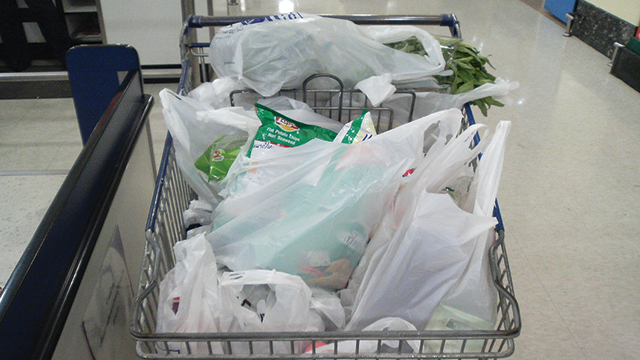Jakarta (Greeners) – Following the paid plastic program enforced by Indonesian retailers association, Minister of Environment and Forestry, Sity Nurbaya, said consumers are not supposed to be burdened by the policy.
The policy declared plastic bags as purchase item in 40,000 retailers members of Indonesian Retail Merchant Association or Aprindo, hence, consumers will be charged at minimum Rp200 (US$0,014) per bag if they choose single use plastic bag.
“Basically, we are correcting the concept of paid plastic program in 2016, because it’s not paying for the plastic and not the plastic being paid by public. If that’s the case, then public will have to buy the plastic bags,” said Minister Siti in Jakarta on Monday. “From the government’s perspective, it is a different concept, public should not be given the burden to the environment, which is plastic. So, [public] should pay the environmental burden not the plastic.”
Furthermore, she said that the ministerial decree of paid plastic bags is still being discussed and will be finalized as soon as possible. The draft has been circulating for more than two years. Nevertheless, Minister Siti said that the policy should encouraged people to bring their own shopping bags and abandon single use plastic.
READ ALSO: Indonesian Retailers Enforce Paid Plastic Program Starts in 1 March 2019
Novrizal Tahar, director of waste management at the ministry, said that the system or concept for single use plastic bag is not to charge public, but by giving discount or cashback for people bringing their own shopping bags.
“Psychologically, Indonesians are happier to be rewarded than punished, because Rp200 can be considered as penalty for people that’s not pro-environment. We can reverse this, so if sirs or mams bring their own shopping bags, they will be receiving cashback or discounts for Rp200-Rp500 (US$0,014-US$0,035). It will attract public more compare than what Aprindo’s program,” said Tahar.
“Back and Forth” Aprindo
Tiza Mafira, executive director of Indonesian Movement for Plastic Bag Diet, said that Aprindo’s move showed that business sector, or retailers, can go with their own programs without waiting for legalization from the government. Previously, the retailers have been reluctant to implement policy to reduce plastic bags and demanded for legal umbrella, instead.
Mafira said that the ‘back and forth’ from Aprindo is because Ministry of Environment and Forestry had issued a letter in 2016 on paid single use plastic bags, which was considered as successful despite only being three months of implementation.
However, Aprindo cut off the paid plastic bags on 1 October 2016 until the government issued regulations on the policy.
READ ALSO: Indonesia To Set Up Regulation on Plastic Bag Levy
Based on Ministry of Environment and Forestry’s monitoring and evaluation, there was 25-30 percent decrease of single use plastic bags during the first trimester. In addition, 87.2 percent of public declared their supports and 91.6 percent agreed to bring their own shopping bags.
“Back then, Aprindo refused to continue the program because they said to wait for the regulation, while, at the same time, the ministry is preparing its legalization. But, Aprindo shouldn’t stopped the program and now, they’re voluntarily implement this program. We call this ‘back and forth’ Aprindo,” she said.
Furthermore, she said that Aprindo should be able to provide data on plastic bags sold in their member retailers.
“We support any efforts focusing on reducing single use plastic bags. We hope for business sector to take active roles in finding solution to reduce plastic waste,” she said. “If they really are serious in reducing plastic waste, then [they] need to be transparent in the data because this paid plastic bag program is not just about profits, but also to decrease production and distribution of single use plastic bags.”
Reports by Dewi Purningsih



















































